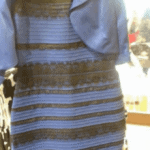What is perception? And why should I care?
By now you’ve probably heard the Yanni vs Laurel recording. And if you somehow missed that, you most likely weighed in on The Dress a few years ago — was it blue and black or gold and white? While these are fun and all, they point to some important concepts that get lost in the laughter.

Not everyone sees the same thing. Not everyone hears the same thing. My husband and I can recall the same shared experience, and remember it in very different ways. So that means one is right and one wrong, right? Not necessarily.
What we see — and hear — is governed by many things. There are physical aspects, often genetic in origin, that affect our perception. Some are obvious, like color-blindness, others are more subtle, like the number of rods and cones in your eyes.
Other differences are cultural. In Athabascan languages, for example, there are several terms for snow. Some are modifications like in English’s “powder snow”. Others are things we’d never consider, like terms translated as “bottom snow” or “wet snow”, used for the layer of snow that produces the most water for drinking. (More here if you’re curious.)
Similarly, linguists working in Papua New Guinea, discovered languages that categorized colors differently than the western world is used to. For example, in one language, there were many words for “green” but none for “blue” (included in the green spectrum). It was determined that in their plant-based diet, being able to differentiate shade of green meant the difference between an edible and a poisonous plant.
And then there are the tricks our own brains play on us. Scientists have discovered that, when confronted with an unknown, such as a made up word or fuzzy photo that is really a construct of nothing, our brain will come up with the “closest thing” that makes sense. Most of us are familiar with the concept of the Rorschach Inkblot test. Others say this is where the Loch Ness Monster comes from.
But that brings up another factor: our experience. You hear a sound in the night; what is your first thought? Burglar? Mouse? The dog roaming around? Or a kid going to the bathroom? What you’ve experienced has a huge impact on what you perceive.
Perception is crucial to communication and social activity. Many times, when my husband and I are having a heated discussion (ok, argument), we’ll discover we are actually saying the same thing — agreeing — but using words that mean slightly different things to the other person, or using them in different ways. He’s originally from rural Southern Mississippi, and I’m from the urban Pacific Northwest. To him, “evening” is anything after 12:00 noon. To me, it’s after 6:00 pm. Culture and experience there. Do you call the noon meal lunch or dinner? If it’s dinner, chances are you grew up in a farming family.
So, who cares? You should. We live in a time of polarization. Politically, culturally, socially, spiritually. Us versus Them. Right or Left, Black or White, Christian or Muslim, Native or Immigrant (think on that a while!). But when it comes down to the nitpickin’, we all want the same thing: food, shelter, safety, community, happiness.
So the next time you feel the righteous indignation rising up at something the “other side” said, ask yourself: what is his/her world like? And instead of concentrating on the differences, look for the similarities. It is from common ground that we can begin to build true communication.
re the cultural differences and word meanings. I always am reminded of when my ex-husband and I were moving. Before he left for work he said, “don’t forget the cheese in the box.” I spent forever looking for cheese in the numerous cardboard boxes surrounding me. It wasn’t until the next morning I found out he meant the REFRIGERATOR. ( He was from Arkansas, I’m from Montana)
Took me a minute. I remember calling it the “ice box” in Montana, but not just the box.